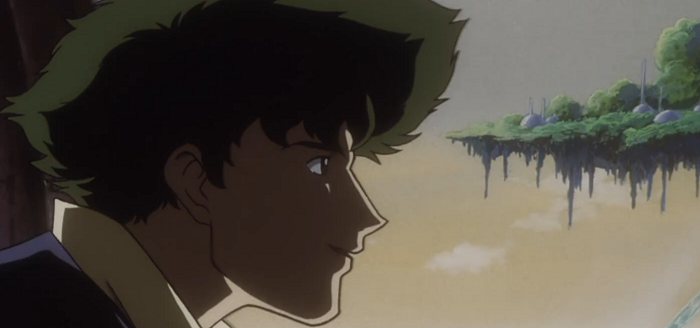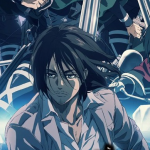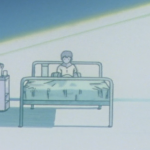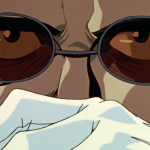Adios, Cowboy: Review 8 – Waltz for Venus
Waltz for Venus might operate within the confines of Cowboy Bebop’s general formula, but it still manages to add something new to the mix. Just as there are three steps in a waltz, this story shifts between three characters: Spike, Faye, and a would-be bounty called Roco. As if to drive home the point from Heavy Metal Queen, it is the outsider who stands as the episode’s protagonist. Even if Roco’s construction leans too hard into the “rogue with a heart of gold” trope, adding a character with a conventionally heroic point of view, which pulls Spike out of his traditionally utilitarian/enigmatic self-motivated worldview, gives this Bebop installment something very unexpected: emotional affect.
Before I go into that, a few words on how Cowboy Bebop is a sweet summer child. The episode’s hook is a hijacking gone wrong. Three people, people who aren’t even branded with the post-9/11 word-of-the-zeitgeist – terrorist – but mere hijackers, attempt to seize control of a (space) plane bound for Venus. Are they armed with box cutters, exploding shoes, sporks, or other such instruments of contemporary terror? No. They smuggled guns into their carry-ons.
Oh, Cowboy Bebop, aren’t you adorable. Guns on a plane. The only way you could be more 20th century is if Spike was smoking on the plane while enjoying adequate legroom and a complimentary drink in coach. Oh wait…
The joke really lands when the bounty for Huey, Dewey, and Louie, the would-be hijackers, rings in at a pathetic ₩1,500,000. Imagine contemporary writers trying to tell this part of the story. I expect they would have the United States government rewarding anybody who stopped a second 9/11 attack with the entire state of Alaska, or at least Utah. There would be book deals, parades, and guest spots on celebrity reality TV shows. Entire country music albums would be cut out of solid platinum to honour the saviours of our time. Either that or everybody involved would end up renditioned to the worst place imaginable for two decades of water boarding and genital torture.
I mean, try to imagine the consequences of Dog the Bounty Hunter hoarding intelligence on a plane hijacking, so he could do something about it on his own rather than calling the Department of Homeland Security.
Unless a person knew what it was to fly before the days of taking off one’s shoes and stepping into the don’t-look-at-my-wiener scanner, there’s no way a contemporary writer or audience would conceive of letting freelancers take care of plane hijackers. So no, younglings, this episode isn’t absurd. It’s doing a perfectly fine job of translating inter-continental flight to interplanetary flight. This is just how things were back in the 20th century, and the episode’s hook is a relic of those bygone days.
Now let’s talk about emotional affect. A writer raised on the internet would have Roco addressing Spike in the fashion of a literal ”notice me, senpai,” meme. Even though Roco is a thief and a low-level criminal operator, he is also the embodiment of earnest enthusiasm. In a show where everybody else is either jazz sexy, jazz cool, or jazz indifferent (I too can put jazz in front of words and hope that it means things) Roco stands out as the epitome of wanting something too much. In this case, Roco wants nothing more than to learn martial arts from Spike.
Spike relents to Roco’s requests, eventually teaching him the fundamentals of his fighting style. This nascent relationship leads to Spike learning that Roco has stolen a plant used in pharmaceutical manufacturing on Venus. In this moment he should see his pupil as a vector for an additional payday. Instead, he dives into the legwork Bebop is so often inclined to skip. Spike probes the causes behind Roco’s actions, going so far as to keep the truth of the situation from Jet, who might be inclined to sell out Spike’s little buddy.
In some ways, Roco might be symbolic of why Spike never bothers with the low-level bounties. The more Spike comes to understand Roco’s motivations, the more he empathizes with both Roco and his family. He lets himself be drawn into their story rather than pulling them into his story, as befitting his title role in the series. While Faye is off kicking down doors and shooting up bars for leads on “pocket change” bounties, Spike is having tea with Roco’s blind sister, Stella.
Spike pieces together that all of Roco’s crimes are because he wants to fund a procedure to restore his sister’s sight. Venus’ terraforming via floating plants produces an acute, one-in-a-million allergic reaction. If left untreated it robs Venusians of their sight. The backstory once more shows the difference between the haves and have-nots within the Bebop setting. An individual’s access to medical care is based entirely on the stack of woolongs to their name.
The writing behind Stella’s character does show its age through the invocation of a blind person having sight beyond sight. Tacky as this move may be, its application explains why Spike is a poor bounty hunter. Spike, according to Stella, is a good person. Compared to Faye, who gathers information by sticking guns in people’s mouths and pointing guns at two dudes having sex in the privacy of their own home, there may be something to Stella’s conclusion, even if Spike, himself, rejects it. At the very least, we have confirmation that Spike is less of an asshole than Faye.
Amid all these warm feelings, I suspected something bad was about to happen. Hey, we live in a post-Battlestar world. I always expect bad things are going to happen to good characters. There’s also the fact that the series has coded a few places as heralds of plot movement. For example, one should never take a pee in a public place in Cowboy Bebop because inevitably hired goons will find you at that moment. Likewise, one should never go to any church/cathedral/mosque because it will result in a gunfight. This tracks with my lived experience with churches.
Roco’s arc ends with him catching a bullet in a cathedral gunfight. As he lay dying, his final request was to ask Spike to take care of his sister, which Spike agreed to without hesitation. In any other story this final favour would be the emotional coda, but this is Cowboy Bebop. Just before Roco dies, he asks Spike if he thinks the two of them would have been friends if they had met earlier in their lives. The pain of this gut punch isn’t felt until the camera pans back to reveal Roco asking the question to nobody. Spike had since ran off to go get help. Alone, Roco’s final thoughts are on a friendship yet to be fully forged.
Killing the good among the morally ambiguous is not a secret power move of writing. Battlestar Galactica did it. Game of Thrones did it. Even Star Trek Discovery tried its hand at strategic character kills. Waltz for Venus’ efforts on this front are successful because they track through yet another three beat pattern: introduction, integration, and then extermination. First, the audience, and Spike, warm to Roco because he’s like Ein in human form. Second, the audience and Spike connect with Roco because his enthusiasm and clear heroic quest resonates with everybody’s sensibilities. Finally, audience and characters, alike, ache because a bad throw of the dice ends Roco’s life.
Admittedly, Roco may have ended up with a bad death even if he hadn’t crossed paths with Spike. What the story does make clear is that without Spike, there would not have been anybody to do right by Stella. The story may not have the concussive force of Ballad of Fallen Angels, but that’s not really what one wants from a narrative born from a single act of kindness. It needs to be smaller and more focused. It’s easy to make a big deal out of the universe being on the brink, but doing so with a single life and a single story among the multitude is a much more satisfying experience.
Waltz for Venus is far afield from whatever arc Bebop might be exploring. It runs its own world of simultaneous detective stories. One of those stories is hardscrabble and filled with violence. The other is quiet and driven by compassion. The latter stands, in my estimation, as one of Space Jazz’s best wins to date. In so much as I find this particular “genre” to be hit and miss, its combination of a slice of life with a hero’s journey works for me. With that said, it is frustrating to see a character brought in only to be killed. However, when a one-off episode sticks the landing as well as Waltz for Venus does, I’m content to focus on the moment at hand and take it as a lesson in character building.













